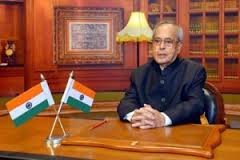New Delhi, Jan 29: The imposition of President’s rule can be liable to misuse but procedural changes over the years have somewhat reduced that possibility, President Pranab Mukherjee has said in his memoir.
The mention assumes significance as the President had on Tuesday signed a proclamation bringing Arunachal Pradesh under central rule on grounds of “Constitutional breakdown”.
The decision has come under the scanner of the Supreme Court which has sought the report of Governor Jyoti Prasad Rajkhowa recommending central rule in the state. While seeking the report, the court described imposition of President’s rule in the north-eastern state as “too serious a matter”.
Mukherjee says the power of the Centre to override the authority of the states in extraordinary situations is clarified through Article 356 of the Constitution.
“There have been times when the provision has been severely criticised due to an alleged misuse of authority by the party in power at the Centre,” Mukherjee has said in his book.
He said the fact that President’s rule was proclaimed on 108 occasions in different states during first 50 years of Republic, till March 2001, “seems to lend some weight to this charge”.
“Though the imposition of President’s rule under Article 356 can be liable to misuse, procedural changes over the years have somewhat reduced that possibility,” Mukherjee says.
Earlier, President’s rule in a state could continue for three years, subject to Parliamentary approval every six months. However, after the 44th Amendment to the Constitution, President’s rule can be imposed for only one year now, subject to approval of both Houses of Parliament within two months of the proclamation.
Mukherjee cited a landmark judgement of Supreme Court which says “The President could not take any irreversible action under clauses A, B and C of Article 356 (1)-which means that the state Legislative Assembly cannot be dissolved till the proclamation is approved by both Houses of Parliament”.
The softening of the powers to declare President’s rule notwithstanding, critics continued to suggest a unitary bias in our federal structure, he writes in the book ‘The Turbulent Years: 1980-1996’ released today by Vice President Hamid Ansari.
“As evidence, they point to the fact that even in subjects under the State list, the Governor may hold back his assent on a Bill passed by the state Legislature and reserve it for the assent of the President.
“A counter argument to this (which I have mentioned earlier), that it is the Centre which has a nation-wide vision and the capacity to consider the interest of the country as a whole. The debate will continue,” the President said.



























